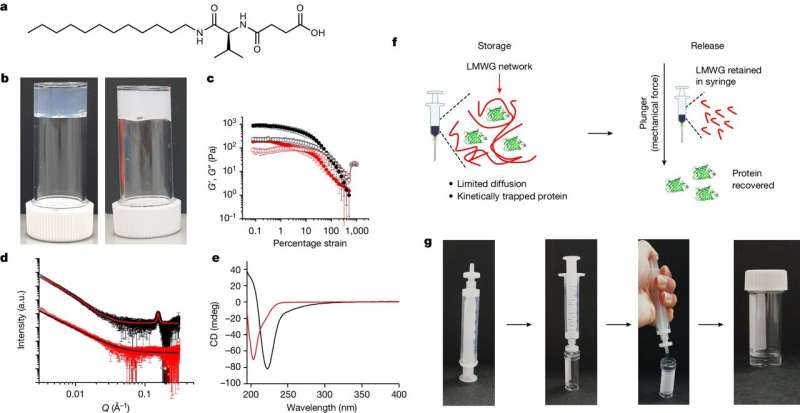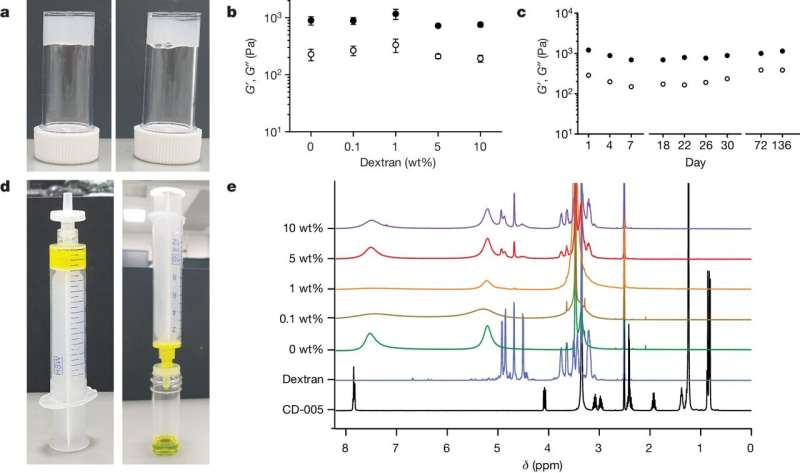This article has been reviewed according to Science X's editorial process and policies. Editors have highlighted the following attributes while ensuring the content's credibility:
fact-checked
peer-reviewed publication
trusted source
proofread
Scientists develop fridge-free storage approach for vital medicines

Scientists have developed a new approach to store and distribute crucial protein therapeutics without the need for fridges or freezers.
The breakthrough, published in the journal Nature, could significantly improve accessibility of essential protein-based drugs in developing countries where cold storage infrastructure may be lacking, helping efforts to diagnose and treat more people with serious health conditions.
The researchers, from the Universities of Manchester, Glasgow and Warwick, have designed a hydrogel—a material mostly made of water—that stabilizes proteins, protecting its properties and functionality at temperatures as high as 50°C.
The technology keeps proteins so stable that they can even be sent through the post with no loss of effectiveness, opening up new possibilities for more affordable, less energy-intensive methods of keeping patients and clinics supplied with vital treatments.
Protein therapeutics are used to treat a range of conditions, from cancer to diabetes and most recently to treat obesity and play a vital role in modern medicine and biotechnology. However, keeping them stable and safe for storage and transportation is a challenge. They must be kept cold to prevent any deterioration, using significant amounts of energy and limiting equitable distribution in developing countries.
The medicines also often include additives—called excipients—which must be safe for the drug and its recipients limiting material options.
The findings could have major implications for the diagnostics and pharmaceutical industries.
Dave Adams, Professor at the University of Glasgow's School of Chemistry, is one of the paper's corresponding authors. He said, "In the early days of the COVID vaccine rollout, there was a lot of attention given in the news media to the challenges of transporting and storing the vaccines, and how medical staff had to race to put them in people's arms quickly after thawing.
"The technology we've developed marks a significant advance in overcoming the challenges of the existing 'cold chain' which delivers therapeutic proteins to patients. The results of our tests have very encouraging results, going far beyond current hydrogel storage techniques' abilities to withstand heat and vibration. That could help create much more robust delivery systems in the future, which require much less careful handling and temperature management."
The hydrogel is built from a material called a low molecular weight gelator (LMWG), which forms a three-dimensional network of long, stiff fibers. When proteins are added to the hydrogel, they become trapped in the spaces between the fibers, where they are unable to mix and aggregate—the process which limits or prevents their effectiveness as medicines.

The unique mechanical properties of the gel's network of fibers, which are stiff but also brittle, ensures the easy release of a pure protein. When the protein-storing gel is stored in an ordinary syringe fitted with a special filter, pushing down on the plunger provides enough pressure to break the network of fibers, releasing the protein. The protein then passes cleanly through the filter and out the tip of the syringe alongside a buffer material, leaving the gel behind.
"Our breakthrough allows us to store and distribute proteins at room temperature, free from any additives, which is a really exciting prospect," says Professor Matthew Gibson.
In the paper, the researchers show how the hydrogel works to store two valuable proteins: insulin, used to treat diabetes, and beta-galactosidase, an enzyme with numerous applications in biotechnology and life sciences.
Ordinarily, insulin must be kept cold and still, as heating or shaking can prevent it from being an effective treatment. The team tested the effectiveness of their hydrogel suspension for insulin by warming samples to 25°C and rotating them at 600 revolutions per minute, a strain test far beyond any real-world scenario. Once the tests were complete, the team were able to recover the entire volume of insulin from the hydrogel, showing that it had been protected from its rough treatment.
The team then tested samples of beta-galactosidase in the hydrogel, which was stored at a temperature of 50°C for seven days, a level of heat exceeding any realistic temperature for real-world transport. Once the enzyme was extracted from the hydrogel, the team found it retained 97% of its function compared against a fresh sample stored at normal temperature.
A third test saw the team put samples of proteins suspended in hydrogel into the post, where they spent two days in transit between locations. Once the sample arrived at its destination, the team's analysis showed that the gels' structures remained intact and the proteins had been entirely prevented from aggregating.
Gibson, Professor at The University of Manchester, is the paper's other corresponding author. He said, "Delivering and storing proteins intact is crucial for many areas of biotechnology, diagnostics and therapies. Recently, it has emerged that hydrogels can be used to prevent protein aggregation, which allows them to be kept at room temperature, or warmer.
"However, separating the hydrogel components from the protein or proving that they are safe to consume is not always easy. Our breakthrough eliminates this barrier and allows us to store and distribute proteins at room temperature, free from any additives, which is a really exciting prospect."
The team are now exploring commercial opportunities for this patent-pending technology as well as further demonstrating its applicability.
Researchers from the University of East Anglia and Diamond Light Source Ltd also contributed to the research.
More information: Dave Adams, Mechanical release of homogenous proteins from supramolecular gels, Nature (2024). DOI: 10.1038/s41586-024-07580-0. www.nature.com/articles/s41586-024-07580-0
Journal information: Nature
Provided by University of Manchester





















